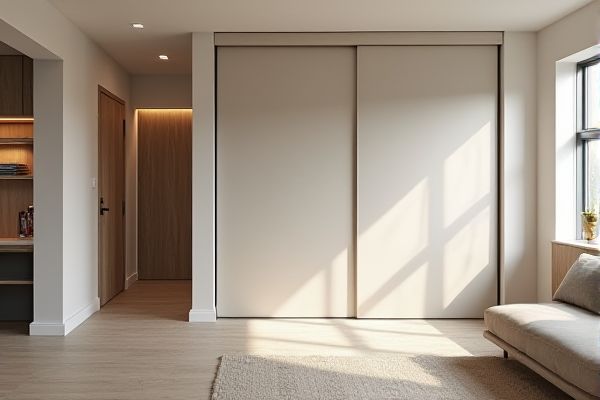
Sliding closet doors maximize space efficiency by gliding along a track, making them ideal for rooms with limited floor area, while hinged doors swing outward, offering full access to the closet interior but requiring more clearance. Explore the rest of the article to discover which door type best suits your storage needs and personal style.
Table of Comparison
| Feature | Sliding Closet Doors | Hinged Closet Doors |
|---|---|---|
| Space Efficiency | Save space; doors slide parallel to the wall | Require clearance to open outward |
| Access | Partial access; only one side visible at a time | Full access to entire closet opening |
| Installation | Requires track installation and adjustment | Standard door hinges; easier installation |
| Maintenance | Track cleaning and roller replacements needed | Minimal maintenance; occasional hinge lubrication |
| Design Variety | Available in glass, mirrored, wood, panels | Wide design range; customizable door styles |
| Cost | Typically moderate to high due to hardware | Generally lower cost; simple hardware |
| Durability | Potential wear on sliding mechanisms | Durable; hinges robust over time |
| Noise | Sliding can cause noise if tracks dirty or damaged | Quiet operation with smooth hinges |
Overview: Sliding Closet Doors vs Hinged Doors
Sliding closet doors maximize space efficiency by gliding along tracks, making them ideal for rooms with limited clearance. Hinged doors offer full access to the closet interior, providing easy reach to all contents but require ample floor space to open. Choosing between sliding and hinged doors depends on your room size, accessibility needs, and aesthetic preferences.
Design and Aesthetic Appeal
Sliding closet doors offer a sleek, modern look that maximizes space by gliding smoothly along tracks, making them ideal for contemporary interiors and small rooms. Hinged doors provide a traditional, classic aesthetic with the ability to showcase intricate paneling or decorative hardware, complementing a variety of design styles from rustic to elegant. The choice between sliding and hinged doors significantly influences room flow and visual appeal, with sliding doors creating a streamlined appearance and hinged doors adding architectural detail.
Space Efficiency and Room Layout
Sliding closet doors significantly enhance space efficiency by gliding parallel to the wall, eliminating the need for clearance required by hinged doors to swing open. This design allows for more flexible room layouts, maximizing usable floor space and enabling furniture placement closer to the closet. In smaller rooms or tight spaces, sliding doors prevent obstruction and facilitate better flow, making them ideal for optimizing both functionality and aesthetics.
Installation Process and Requirements
Sliding closet doors require a top track installation with precise measurements to ensure smooth operation, while hinged doors need sturdy hinges mounted on the door frame for proper swinging. The installation of sliding doors demands a clear overhead space and a level floor to prevent misalignment, whereas hinged doors require adequate clearance around the door to open fully. Your choice depends on available space and ease of installation, as sliding doors are ideal for tight areas and hinged doors suit wider openings with enough room to swing open.
Accessibility and Ease of Use
Sliding closet doors save space by gliding along tracks, allowing easy access to half the closet at a time, making them ideal for tight rooms where door clearance is limited. Hinged doors offer full access to the entire closet instantly, which can be more convenient for reaching items stored at the sides or corners. Your choice depends on whether you prioritize maximizing room space or having unobstructed access to the entire closet at once.
Durability and Maintenance
Sliding closet doors typically offer enhanced durability due to fewer moving parts exposed to wear and tear, reducing the risk of hinges loosening or breaking over time. Maintenance for sliding doors often involves occasional track cleaning and lubrication, which is simpler compared to the frequent hinge tightening and alignment required for hinged doors. Your choice between these options depends on whether you prioritize low-maintenance durability or the ease of accessing the entire closet at once.
Cost Comparison
Sliding closet doors typically cost less than hinged doors due to their simpler hardware and installation requirements, making them a budget-friendly option for many homeowners. Hinged doors often involve higher expenses because of larger door panels, additional framing, and more complex hinges, which can increase both material and labor costs. Your choice between sliding and hinged doors can significantly impact your overall renovation budget depending on these cost differences.
Customization and Material Options
Sliding closet doors offer extensive customization options, including a variety of materials such as glass, wood, aluminum, and mirrored panels, allowing you to tailor the look to your room's style and functionality. Hinged doors provide more traditional choices, often limited to wood or MDF, but allow for intricate designs and raised panel styles that enhance classic decor. Your selection hinges on whether you prioritize versatile material options and space-saving design or prefer the detailed craftsmanship and full-door access that hinged doors provide.
Safety Considerations
Sliding closet doors reduce the risk of accidental finger pinching and provide a safer option for homes with children or elderly individuals due to their smooth, track-based operation. Hinged doors require clear floor space to open, which may pose a tripping hazard or obstruct pathways in tight areas, increasing the risk of injury. Safety features such as soft-close mechanisms and shatter-resistant glass can enhance both sliding and hinged door designs, minimizing potential accidents and damage.
Choosing the Right Door for Your Closet
Sliding closet doors save space by gliding along tracks, making them ideal for small rooms or tight areas where clearance is limited. Hinged doors offer full access to the entire closet at once, allowing for easier organization and visibility of your belongings. Consider your room layout and how you use your closet to choose the right door that maximizes convenience and functionality for your needs.
 homyna.com
homyna.com